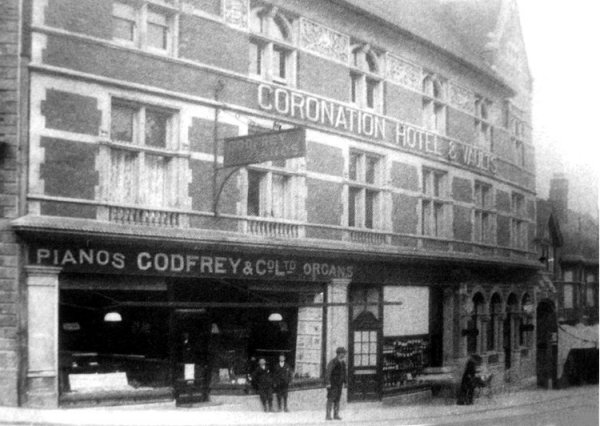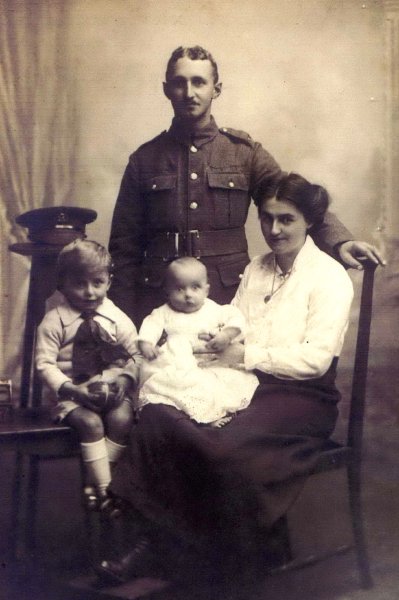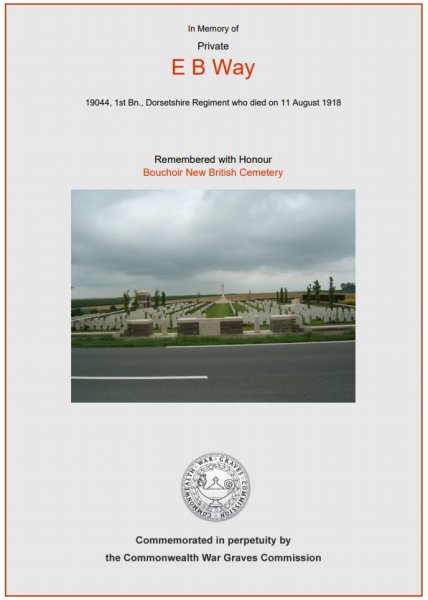yeovil at War
Evered Bruce Way
Killed in action during the Battle of Amiens
Evered (often written as Everard) Bruce Way was born in Tincleton, Dorset, in 1889 and baptised there on 6 October 1889. He was the youngest of the five children of master blacksmith Uriah Way (1845-1932) and Jane née Robins (1858-1929). Uriah and Jane's children were Louis Samuel (1881-1935), Harold Egbert (1884-1981), Ethelbert Thomas (1886-1968), Mable Ella, known as Ella (1888-1960) and Evered.
The family were living at Tincleton and listed in the 1901 census as well as the 1911 census - although by the time of the latter, Evered had move to Yeovil and was boarding at 9 Mill Road (Mill Lane ?) with the family of William Palmer. 21-year old Evered gave his occupation as a music salesman. From 1903 until he enlisted, he worked for Godfrey & Co in the Triangle.
In the autumn of 1912, Evered married Maude Hodges (1890-1935) at Yeovil. They set up home at 118 Goldcroft and were to have two sons; Arthur Bruce (1913-1996) and Harold J (1916-1970).
 Evered
enlisted at
Yeovil on 20
July 1916,
joining the 1st
Battalion,
Dorsetshire
Regiment. His
Service Number
was 19044.
Evered
enlisted at
Yeovil on 20
July 1916,
joining the 1st
Battalion,
Dorsetshire
Regiment. His
Service Number
was 19044.
The 1st
Battalion,
Dorsetshire
Regiment had
been fighting on
the Somme. On
1st July 1916
(the start of
the Somme
offensive) they
attacked near
Authuille Wood
(now Haie Wood)
with 69 men
having died on
that day and
total casualties
of some 501 men
killed, wounded
or missing over
the first three
days of the
battle. After
several days of
heavy losses,
the Battalion
were withdrawn
north until
October.
In November they
fought again
near Beaumont
Hamel in the
closing stages
of the
offensive.
In November 1916, Evered was posted to France to join his battalion and would probably been involved in the action at Beaumont Hamel on arrival.
In 1917, after a
long period near
Nieuport, the
Dorsets were
thrown into the
final attack at
Passchendaele
near Ypres.
After a brief
rest, they
returned to the
Ypres sector in
Houthulst Forest
but, on 27 March
1918 they were
rushed to Arras
to help halt an
overwhelming
German attack
which proved be
the final major
German offensive
of the war.
During the night
of 20-21 May
1918 the Dorsets
were involved in
a raid at
Hamelincourt,
described as
being one of the
finest raids of
the war, which
cost them 77 men
and 7 officers
killed or
wounded.
After the German
offensive was
halted, the
final Allied
advances began.
In the Battle of
Amiens in early
August 1918, the
Battalion
attacked at
Damery.
Evered was with his regiment when they took part in the Battle of Amiens, 8 to 11 August 1918. The Battle of Amiens, also known as the Third Battle of Picardy, was the opening phase of the Allied offensive later known as the Hundred Days Offensive that ultimately led to the end of the First World War. Allied forces advanced over 7 miles (11 kilometres) on the first day, one of the greatest advances of the war. The battle is also notable for its effects on both sides' morale and the large number of surrendering German forces. This led Erich Ludendorff to describe the first day of the battle as "the black day of the German Army". Amiens was one of the first major battles involving armoured warfare and marked the end of trench warfare on the Western Front.
The 1st Battalion lost 321 killed, wounded or missing. 30-year old Evered was killed by a machine gun bullet on the last day of the battle, 11 August 1918.
The Western Gazette, in its edition of 6 September 1918, reported "Lance Corporal EB Way, of the Dorset Regt., whose wife lives at 118 Gold Croft, has been killed in action in France. He was 30 years of age and joined up on July 20th 1916, and was drafted to France in November of the same year. For 13 years he was engaged in the piano and music warehouse of Messrs. Godfrey & Co., The Triangle, and was very well known. Mrs Way received a notification from the Record Office that her husband was wounded but later received a letter from a chaplain to a Canadian unit, to the effect that Lance Corporal Way had been killed in the recent advance and that his body had been buried in a wheat field behind the present front line. The chaplain added that he had apparently been killed by a machine gun bullet whilst gallantly advancing on the battlefield, and that death had evidently been instantaneous."
Evered Way was buried at Bouchoir New British Cemetery, Somme, France, Grave III.E.110. and his name is inscribed on the War Memorial in the Borough.
gallery

An early photograph, taken about 1905, just after the Coronation Hotel & Vaults opened with Godfrey & Co Ltd's piano and organ shop, where Evered was a music salesman, on the ground floor.

Evered with his wife Maude, 3-year old son Arthur Bruce and baby John Harold. Photographed in 1918, shortly before Evered's death.

The Commonwealth War Graves Commission certificate in memory of Evered Way.